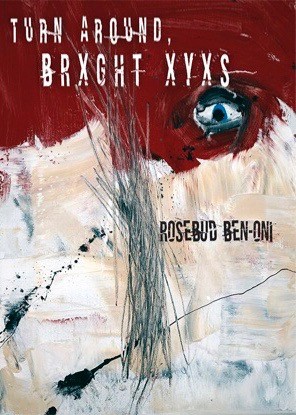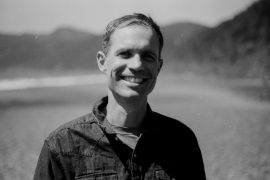Our interviews editor Esteban Rodriguez talks with Rosebud about her favorite musicians, identity, the place and purpose of literature in today’s socio-political landscape, and her forthcoming collection, turn around, BRXGHT XYXS (Get Fresh Books, 2019).
Tell us a little about your collection turn around, BRXGHT XYXS and how you came to write it.
I came to write this particular collection at dozens of different points of entry, but I’ll choose one to share here…
Although the book takes her title from the Bonnie Tyler song, I had a breakthrough at a CantoMundo summer retreat at the University of Texas at Austin that I attended in 2014. At that time, I was working on a very different version of the book, a manuscript called BLOODSPORT, and being frustrated with most of the poems within and the overall structure. Worse, something central and something preliminary— what did Hitchcock say? There is no terror in the bang, only in the anticipation of it.— the forming itself was missing. Like D.O.A & no one’s even taken a full breath. Like C.O.D & no one’s answering the door. I mean: the manuscript’s electrons had no spin & sting, no buzzing in my ear…
So I remember arriving that first day at CantoMundo, and hitting up the commissary store for water and a 3 Musketeers bar, and hearing New Order’s song “Temptation” coming on. It dawned on me on that very hot July afternoon that this song pops up at times, in places when I’ve felt most lost, and guided my next decision in some way or another. The first time this happened, I believe, was in 2008, after an on-and-off again relationship that terminated in two hemispheres of breakup. I was living in Crown Heights, Brooklyn, for a brief, terrible summer, before moving to Woodside, Queens, and getting a second chance at life. But at that summer I didn’t know I’d fall in love again, and make the life-saving jump to Queens. I was very, very broke, teaching at two colleges that summer, barely making rent, utilities and subway fare, ashamed to see family and friends, some of whom didn’t know I’d given up on making a life in Jerusalem, finishing my Ph.D. there. There was a café close to my apartment I’d go to write and grade papers because they had free Wi-Fi, and I remember the café owner— after occupying a table for a few hours and only ordering a single cup of coffee— would always send me home with a bag of free bagels and food because, to be honest, I didn’t have money. I remember going into the grocery store and staring at the shelves and not having money. That summer I felt very, very low. I’d failed at love, at completing scholarly work, at making a living I was failing my family who’d placed so much hope within me.
Anyway. That summer of 2008, as I was sitting the café grading papers, this song “Temptation” came on. I’d heard it before— I have the Trainspotting soundtrack. But there was something in that exact moment, when I heard “Up, down, turn around/Please don’t let me hit the ground/Tonight I think I’ll walk alone,” that I knew two things in my heart: (1) the road was not going to be any easier but (2) I’d would survive and find a kind of happiness, even if it came at residual and new costs.
Fast-forward to 2014, I hear this song at the commissary at UT-Austin. Six years later, after that terrible summer in 2008. I’d found an amazing love and made a lifelong commitment. I had my first book Solecism come out in 2013. I was also at the beginning of a chronic illness that affects my nervous system, but all in all, I was in a much better place than I’d ever been in my life. I remember closing my eyes. I remember the song playing over and over in my head as day turned into night, and we began with Opening Circle, and the very awesome sound that is J. Michael Martinez’s laughing ringing through our ears, and writing this poem that riffs on his name in the most power-ballad-biblical way. I remember driving around Austin with Octavio Quintanilla and Juan Morales and Diego Baez and Darrel Alejandro Holnes, and writing this poem on Latinidad. That summer, and the one after it, the 2015 retreat, is when I wrote most of the key poems. I’m still trying to explain that magic that is the gathering of Latinx poets all in one room. It literally woke the dead out of what was BLOODSPORT and transported the would-be collection to “your hair is beautiful/ oh, tonight/oh—/ Atomic” madness.
I mean the way Deborah Harry says in such deadpan serious ATOMIC. in Blondie’s “Atomic” that it comes off half-exclamation and half-declaration.
That kind of in between melodramatic-serious joy-sadness.
That’s how the collection came to me, when I felt “I’ve lost some need/ That was urgent to myself, I do believe,” and those nights I decided to “walk alone” to “find my soul as I go home…” as New Order’s “Temptation” goes, I had to go it on my own first. I had to have that pain. The music was there with me.
In 2008, I trusted that.
In 2014, the trust deepened into true belief.
Music – from the lyrics sampled and incorporated seamlessly into many poems, to the reference to artists such as Julee Cruise, Bonnie Tyler, Spice Girls, Credence Clearwater Revival, and Menudo – set not only the foundation for the work, but help drive the content and narrative. What prompted the inclusion of such a wide variety of musical artists and lyrics, and how did this inclusion develop over the course of writing the collection?
Music is how I escaped as a child. I listened to everything. I still do. R&B, Rock, Blues, Jazz, Metal, Classical, Rap, EDM, Funk, New Wave, Pop, Alt-Rock, House, Country, K-Pop… and Power Ballads are found in almost all of these genres.
Here’s the thing power ballads do: they never let the listener go. They entangle one’s psyche and emotions into their world, into the music and lyrics and mood, turning sound into something nearly tangible. You can hold a power ballad in your mouth. It rumbles your insides. It lingers. It discomforts. It saves. It destroys. It forces even the most cynical of us to dig back into a buried memory and sit in the dirt, take stock, swallow hard, run out of steps when trying to walk away. It chases you into the dead of four o’clock shadows on some random weekday when it’s both humid and cold, when it’s drizzling but not enough to need an umbrella.
Take, for instance, one of the most popular power ballads of all time. Guns N’s Roses’s “November Rain.” There was time that metal bands were coming out with albums that had at least one power ballad. Allegedly the inclusion of a ballad on metal band album were nothing more than a gimmick; they were marketed to temper an album full of metal’s aggressive, faster tempos, and to ensure more air play on radio stations by appealing to audiences whom otherwise might not care for metal.
But I completely disagree. The depth of “November Rain” speaks for itself. Although I don’t reference the song specifically in this collection, it made quite an impression on me as a kid. There’s this particular moment when Slash exits the grandiose wedding played by real-life couple, Axl Rose and Stephanie Seymour— remember how she towered over him? Remember her iconic dress, designed by Carmela Sutera, cut high in the front, garter on display, how she could make the delicate completely punk rock? But I digress— anyway, Slash exits the wedding (which at first seems like it’s happening inside a cathedral) to play his guitar solo outside, and only then do we see the revelation of a smaller, isolated church in the middle of nowhere. I remember this scene because it was the first time I saw Slash’s face; just as the church was stripped of its size and ceremony, Slash is stripped too, of his trademark hat and sunglasses, the wind blowing his hair out of his face. He was so oddly vulnerable in this scene, his solo filled with angst and longing.
Naturally my young mind ran amuck with this. I thought that Slash’s character was in love Seymour’s character and felt deceived, as she is allegedly shot by someone toward the end of the video, which is why half of her face is hidden while she’s lying in the casket, her actual death completely hidden from camera. (There are many other theories about her death, but I’m convinced it’s about spurned love and deception.) I felt this way, mainly because young me was “in love” with Stephanie Seymour. Actually, take off the quotes. Young me was in love with Stephanie Seymour.
It was around this time I was realizing I was attracted to women, but couldn’t come out at the time for fear of social isolation. The video was a summation of my candidly-dramatic sexual confusion. The longing of Slash’s first two guitar solos in the power ballad became my longing, and the mournfulness anger in his third and final solo over the lyrics that Axl sang— “Don’t ya think that you need someone/ Everybody needs somebody/ You’re not the only one” became very personal to me.
I internalized this as the tangible impossibilities of love. How you could come so close to forming a bond with someone, to see it stripped away before it’s even celebrated, to feel the rain come down on you though it’s coming from somewhere else, and have that feeling take you to another dimension? It was the first time love and sexuality meant I wanted to leave the dimension that I was living in, my then-present dimension now slight and sad, not even large enough to express the melancholy I needed to escape it. So when Stephanie Seymour’s character died, the tears I cried were real tears, both for her character and for my own sexual feelings at the time.
That’s what I mean by the “candid-dramatic” that power ballads can bring out in youth: how love is first both magnified and shrunken in perspectives not your own.
In the same vein as the musical elements in the collection, geography/place factors in significantly. If we as readers are not momentarily transported to Israel, Hong Kong, or New York (just to name a few places), we are at least introduced to other regions (Kentucky, the Rio Grande Valley in deep south Texas). How important is place in your work, and how do you see your poems interacting with each other based on those places mentioned?
Place is very important to me, and it’s hard to explain how without music, as no matter where I went, the thread of equal grounding and transcendence, past and future, stayed with me in a present continuous often filled with doubt. Concerning this collection and all the places in her, it’s impossible to not mention how “Total Eclipse of the Heart” (and the video too) shaped the geography of the book itself.
I found the best way to express any of the geographies I hold is through poetry, where I can explore my Latina-ness, my queerness, my Jewishness, my true love for bad, bad movies like Showgirls, Xanadu and Manos Hands of Fate (for these are places of magic too), through the power of exponential heartbreak and ghosting night trains and the death of my eldest maternal uncle, Julian “Balani” Gomez the II, for when he died, he took a large part of my childhood and rootedness to the Rio Grande Valley with him. I wrote this poem for him that appears toward the end of the collection, trying to keep him here on earth, with me in the RGV, which was not really present day RGV, but the one of my youth, the one that belongs to my younger self Matarose. At the end of the poem, I realize I have to let him go, but not before taking one last “trip” with him. Which, in real life, I did and did not. Which was, in real life, my memory taking a life of its own, rushing through a palpable, disjointed catalogue of all the time we spent together, but in silence, without words, without the words that shaped the poem.
I suppose there’s really no other song like “Total Eclipse of the Heart” because it’s over-the-top flash as it is otherworldly and without place. It is true love incarnate as it is an escape from love. It’s loud as it is soft. It’s circus; it’s mourning. I listened to the song many times when I was running away from someone or some place, and listened to it again when I resurfaced; I believe it takes a special kind of song to re-center you, just as it disappears you and then catapults you to the next unknown. I listened to it all the times I left my ex-girlfriend, who features prominently in the book; and I listened to it when we got back together. When I left Jerusalem. When my uncle died in the Rio Grande Valley, and then my eldest aunt, Olivia Cisneros passed away a year later in Chula Vista, in California, far away from the RGV, which made me realize my own far-away-ness here in NYC. I listened to it when I fell in love, when I fell for real, into a love present continuous alongside all those losses past continuous that lives here in Queens. At my best, I’m a fickle electron who never believed in calling anything or anyone home, but then it happened. I wanted to construct a book that’s in harmony with such threads, and I hope I did.
There are certain poems with biblical references, and although the speaker in them isn’t spiritual (in the traditional sense of the word), there seems to be a recognition of spiritual inquiry on behalf of others. For example, in “If Cain the Younger Sister,” the speaker’s brother is suspicious of religiously inclined leaders and tries to maintain a sense of social purity:
My brother is a whitewashed synagogue.
His words are mud-bricked and windowless.
From desert frond and dust he builds a home.
A man of principle, my brother
Remembers the Alamo.
He tried to guide me
Training-wheel free
So I wouldn’t fall
For men like Crockett or Koresh.
How did poems of this nature come to be and why were they important to include in this collection?
Speaking of threads, I was raised a very observant Jew, and although I don’t belong to a synagogue anymore, my personal inner clocks and sense of time are still set to the Jewish calendar. My mother, who was born Catholic, converted to Judaism before my brother and I were born; this definitely set us apart from the other kids at Hebrew school and in our synagogue. I’ve written quite a bit about this, so I won’t get into it here, but it was often very difficult for us, as we came from a mixed family. There were little things— like one of the rabbis refusing to call me my mother by her name Esperanza— and bigger things, like refusing to let us enter the temple to pray for the High Holy Days because my father didn’t have the money to pay membership dues. It hurts to be turned away, in front of a line of people behind you whom you knew on some level were never your community. My Aba doesn’t like me telling this story because Anti-Semites use these kinds of situations in hateful rhetoric. I didn’t like telling it because I didn’t want my Aba and myself to feel the deep sense of shame that we did. But this happened to us, and it’s important to talk about them, to right the wrongs done to those who believe there are of something, but cannot completely belong to it, for one reason or another.
This poem is based on my brother, and how he truly is a person of principal. And sometimes with people of principal, they don’t understand those (like the speaker, like this poet here) who choose a more reckless life based on decisions made in passion and desire. To be fair, I don’t really understand human behavior either. I certainly don’t understand my own. I do believe in what I call “listening to the music” to guide my decisions, which to a practical person doesn’t make a lot of sense. After all, as New Order sings in “Temptation,” often those “bolts from above hurt the people down below” and leave “people in this world” with “no place to go.”
I understand the poetry of this before I understand the reasoning of this.
In a strange way, it informs my own sense of Judaism, that I do believe in the Jewish God of my childhood who accepts my doubt in all areas of my life, and that it took me a long time to trust the music, although I always heard the music.
How do you see this collection interacting with the world? What you do hope readers take away from it?
Joy. I want them to feel some sense of joy. I LOVE the poetry that’s being created right now. There’s too many names, so please forgive me for not being able to name everyone, but I love the work by Chen Chen, Tara Betts, Ruben Quesada, Samantha Zighelboim, Cortney Lamar Charleston, Miller Oberman, Joshua Jennifer Espinoza, Roger Reeves, Natalie Diaz, Vanessa Angelica Villarreal, Harmony Holiday, Aimee Nezhukmatathil, Ada Limón, D. A. Powell, Emily Jungmin Yoon, Danez Smith, Terrance Hayes, Reginald Dwayne Betts, Ross Gay, Angel Nafis and Victoria Chang. I regularly teach these poets. And of course all my fellow CantoMundo poets.
I feel blessed that my work is living along besides theirs, creating new subatomic particles that move too quickly to bear just one name. These are the multitudes I really want to be a part of.
If you could describe your poetic journey in a few words, what would they be?
Wayward Electron Mess.
What role, in today’s social and political climates, does poetry (and literature in general) play?
First, I’d love to illustrate this by providing a few links to the poets I’d cited above: “Self-Portrait as So Much Potential” by Chen Chen; “I’m Rooting for Everybody Black” by Cortney Lamar Charleston; “Dinosaurs in the Hood” by Danez Smith; “The Demagogue Diet” by Samantha Zighelboim; “Wake Me Up When My Gender Ends” by Joshua Jennifer Espinoza; “Domestic Violence” by Roger Reeves; “Barbie Chang Should Have Seen” by Victoria Chang; and “Exercise in the Face of Divorce (after David Campos)” by Vanessa Angelica Villarreal.
This country is a very, very young country. While one could say it’s canon is still being written, I don’t believe in canons. I don’t believe in a single guiding star that tells you where to go. I think to understand humanity you have to be prepared to confront a multi-tongued, multi-narrative ad non-linear force that is perpetually shaping and being shaped by those who explore the power of language through poetry. As for myself, some of the poems in turn around, BRXGHT XYXS have weird syntax because there’s no other syntax they could have existed in. Some of them deal with the violence I’ve faced and surfaced from, and tried to un-internalize, and while I don’t think I’ll ever be completely free of the more painful memories, poetry has given me the capacity to hold them in my own words, so that they won’t be forgotten and swept under the rug of white supremacy and other toxicities who’d love to keep single guiding stars under their control, in order to own the whole sky.
Just wait until we have zero-point energy, but that’s another story, for another time…
What’s your best advice to younger poets? What advice would you give your younger self?
It’s a tired phrase, but failure is a part of growth. Read as much as you can. Don’t let doubt stop you from entering a room. If someone belittles or insults you, realize it’s more about their own insecurity than you. My younger self, Matarose, had to put up a lot of petty people and though she had a lot of doubt and uncertainty, she just never listened and went on, driven by the need to make art. She certainly won’t listen to me now, sitting here with the cat and my love, the latter who’s patiently waiting for me to finish this so we can go to Soleluna on Queens Boulevard for dinner. Matarose would slip a 3 Musketeers bar in my pocket before getting on the 7, and tell me not to worry about anything, that she has no idea what she’s doing, that I actually still have no idea what I’m doing, that we both, like power ballads, don’t quite belong on the albums that only later very much need us too…





